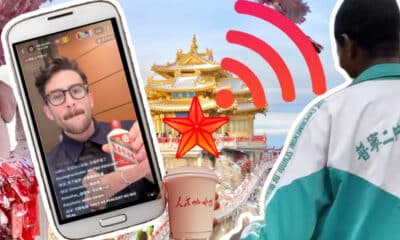China Memes & Viral
China’s Trending Terminology: Top 25 Buzzwords and Catchphrases of 2023
Which words and phrases made it to Weibo’s top trending lists in 2023? We’ve compiled a top 25 of the most popular and noteworthy buzzwords.
Published
2 years agoon
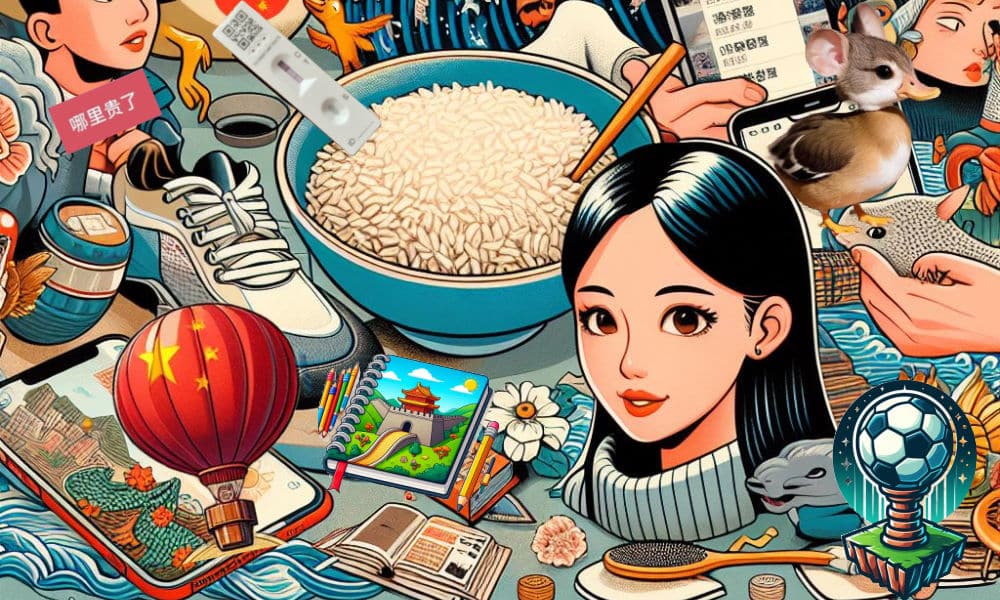
PREMIUM CONTENT
Here are 25 Chinese buzzwords and catchphrases, listed by What’s on Weibo, that reflect social trends and changing times in China in 2023.
At the end of every year, Chinese media outlets usually compile a list of the most noteworthy buzzwords or the words that made the most impact during the year.
The most popular new words and expressions are generally listed by the Chinese linguistics magazine Yǎowén Jiáozì (咬文嚼字), which selects ten noteworthy buzzwords (十大流行语). On social media, Chinese online (state) media always promote the magazine’s selection of the top words and terms of the past year, but there are also other outlets selecting their top words of 2023, which have become a relatively big topic on Weibo over the past month.
In previous years, we’ve also published several articles in which we have listed the most important buzzwords.
◼︎ In 2018: China’s Top Ten Buzz Words & Phrases of 2018
◼︎ In 2019: Top 10 Buzzwords in Chinese Online Media 2019
◼︎ And in 2020: The Top 10 Buzzwords in Chinese Online Media in 2020 (咬文嚼字)
◼︎ And for 2020-2023, we also compiled this big Covid-19 vocabulary list.
If you want to know more about the buzzwords that made it to Chinese (official) media’s lists this year, check out this post by Andrew Methven at Slow Chinese which is a top ten compilation of Chinese buzzwords of 2023 based on these lists.
Top 10 Buzzwords by Yǎowén Jiáozì
The top 10 by Yǎowén Jiáozì consists of the following words:
1. 新质生产力 (Xīn zhì shēngchǎnlì)
This refers to “new quality productivity,” a term introduced by Xi Jinping this year focusing on a form of production driven by technological innovation as a new engine for China’s economic developmentin the new era. It covers technological innovation, new forms of energy, emerging industries and their interaction and integration, especially progress in digitalization, intelligence and green development.
2. 双向奔赴 (Shuāngxiàng bēnfù)
This means “running towards each other” or “devote efforts from both directions.” The phrase has become frequently used by Chinese netizens in the context of romantic love, meaning both sides are equally involved and putting in all effort to keep the love alive (双向奔赴的爱情).
3. 人工智能大模型 (Réngōng zhìnéng dàmóxíng)
“Large Scale Artificial Intelligence Models,” refering to the series of AI applications that we saw rising this year, including ChatGPT and Ernie Bot.
4. 村超 (Cūn chāo)
This term means “Village Super League,” a soccer event in Rongjiang County, Guizhou Province, organized by local villagers. It gained significant attention this year, drawing passionate new fans and showcasing China’s vibrant rural sports scene.
5. 特种兵式旅游 (Tèzhǒng bīngshì lǚyóu)
It means “special forces-style tourism”: special forces travelers have been flooding popular tourist spots across China. Their mission is clear: covering as many places as possible at the lowest cost and within a limited time. While the travel trend has become a social media hype, there are also those criticizing the trend for being superficial and troublesome (read here).
6. 显眼包 (Xiǎnyǎn bāo)
A goof, the life of the party, the class clown; the term “显眼包” in Chinese refers to someone or something that stands out from the crowd or grabs attention. While it previously had a negative meaning, standing out from the group is now also seen as having a goofy, bubbly and enjoyable personality that brings happiness.
7. 搭子 (Dāzǐ)
Dāzǐ translates to “companion,” “buddy,” “mate,” or “partner,” typically referring to someone you hang out with for particular activities who is not your significant other. You can have a “coffee buddy” (咖啡搭子), drinking buddy (酒搭子), or a “travel buddy” (旅游搭子). Chinese media have described the word as reflecting a new social trend among young people who might be single but still find various ways to have a satisfying social life that suits their needs.
8. 多巴胺×× (Duōbā’àn ××)
Dopamine is associated with happy hormones – pleasure and reward in the brain, and “××” indicates it’s being used in various contexts or activities related to pleasure or enjoyment. The term popped up this year in the context of ‘happy hormone fashion’ or ‘dopamine dressing’ (duōbā’àn chuāndā 多巴胺穿搭) the art of wearing colorful clothes to foster a good mood and positive vibes. Now, the use of ‘dopamine xxx’ is also used in other contexts.
9. 情绪价值 (Qíngxù jiàzhí)
This refers to “emotional value,” and is originally used within marketing to refer to the impact of consumers’ emotions on the products and services they purchase. This year, the word became more important as Chinese (young) consumers are shifting from merely ‘buying to use’ to actively participating and immersing themselves in experiences, such as the ‘special forces tourism’ (also in this list), city walks, enjoying Zibo barbecue, or purchasing virtual products that bring some kind of emotional value to them.
10. 质疑××,理解××,成为×× (Zhìyí ××, lǐjiě ××, chéngwéi ××)
This phrase means “question, understand, and become,” popularized because of the Chinese TV series iPartment (爱情公寓, ài qíng gōng yù). Initially, viewers questioned the female lead’s decision to prioritize her career over marriage. However, with time, they began to understand her perspective and realized that romantic love isn’t the sole priority. This pattern can also apply to various other scenarios and settings where initial doubts give way to comprehension and acceptance.
Top 25 Buzzwords/Catchphrases by What’s on Weibo
Here, we have made a special What’s on Weibo top 25 of top buzzwords and catchphrases of 2023. Most of these words have previously been featured in our premium Weibo Watch newsletter, where we select a word of the week for each issue.
These words are not in order of popularity, but rather in order of appearance throughout the year.
#1: FINAL-ROUND PLAYERS

Juésàiquān Xuǎnshǒu (决赛圈选手)
Over three years after the Covid-19 outbreak in China, it became increasingly uncommon to find people who hadn’t tested positive for the virus. After China eased its strict ‘Zero Covid’ measures in December 2022, infections surged across the nation, peaking in January 2023. By late January, over 80% of China’s population had contracted Covid. During the 2023 Spring Festival travel period, individuals wearing full protective gear stood out and attracted attention. During this time, Chinese media and netizens began calling those who remained Covid-free since 2020 the “final-round players” (决赛圈选手), suggesting that they were like finalists in the last round of the ‘avoid getting Covid’ game (read more).
#2: WANDERING BALLOON
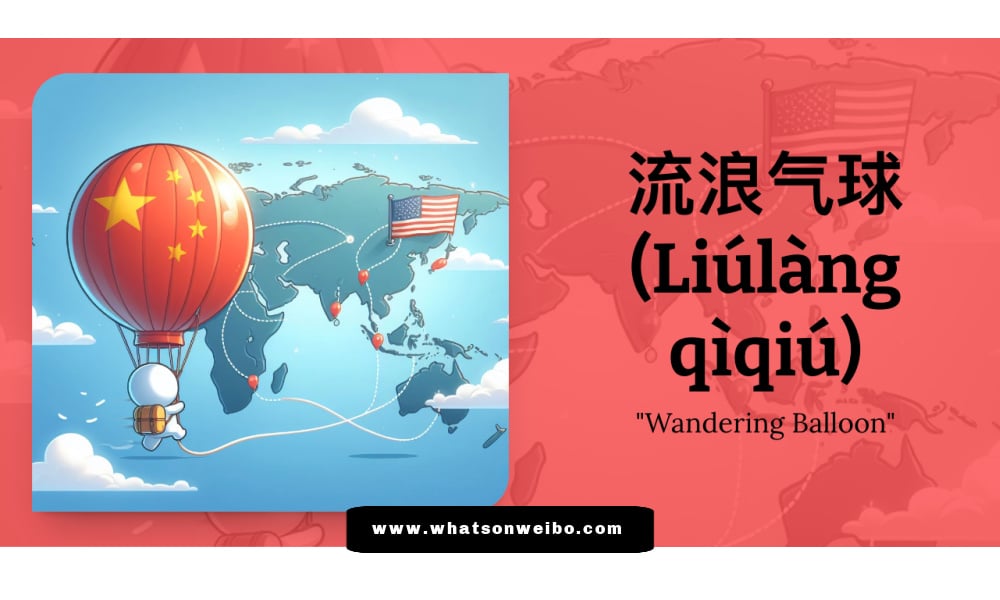
Liúlàng qìqiú (流浪气球)
The ‘Wandering Balloon’ – liúlàng qìqiú 流浪气球 – emerged as a notable buzzword in February 2023 among Chinese netizens as the so-called ‘balloon incident‘ sparked an international dispute. The incident revolved around the U.S. military shooting down a Chinese balloon off the Carolina coast. While the U.S. labeled it a spy balloon, China contended it was a civilian “airship” (“飞艇”) for weather monitoring that drifted off course due to wind. On Chinese social platforms, this incident linked the balloon to the box-office hit The Wandering Earth II, leading to humorous online discussions. After reports of the balloon being shot down surfaced, some Weibo users playfully mourned the “poor baby balloon,” suggesting it was abruptly brought down without its chance to roam freely. The connection between the balloon incident and the sci-fi film’s popularity wasn’t surprising, given the movie’s enormous popularity and considering its narrative is all about catastrophic events and the future of international society. Read more about the incident and the words used here.
#3: BLIND WORSHIP OF FOREIGN GOODS/IDEAS
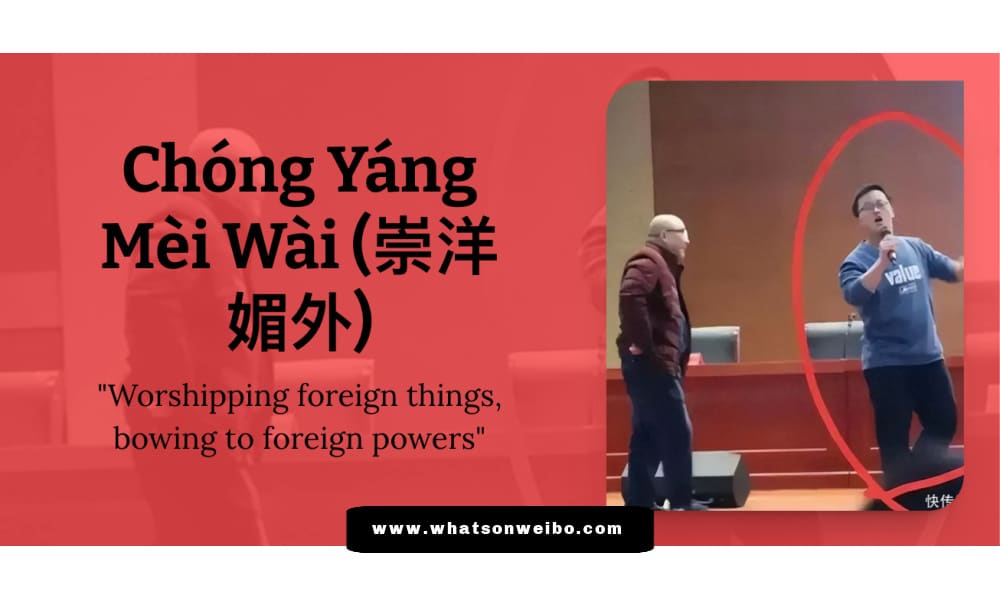
Chóng Yáng Mèi Wài (崇洋媚外)
This word/expression has come up a lot this year and specifically was used a lot when one incident went absolutely viral. In February of 2023, a Chinese associate professor named Chen Hongyou (陈宏友) stirred major controversy for remarks made during a speech at a school in Hefei, Anhui. According to various blogs and social media posts, Chen basically talked about how mixing races – ‘the further apart partners live, the better’ – would provide better genes for the next generation. He is also said to have suggested that his son, now living in the US with an American wife, would have children with better genes. In the middle of his speech, a student in the audience stormed to the stage and accused the professor of “worshipping foreign things and bowing to foreign powers [崇洋媚外].” This phrase, chóngyáng mèiwài, the popped up in hundreds of online discussions following the incident. Read more about that here.
#4: TOXIC TEXTBOOKS
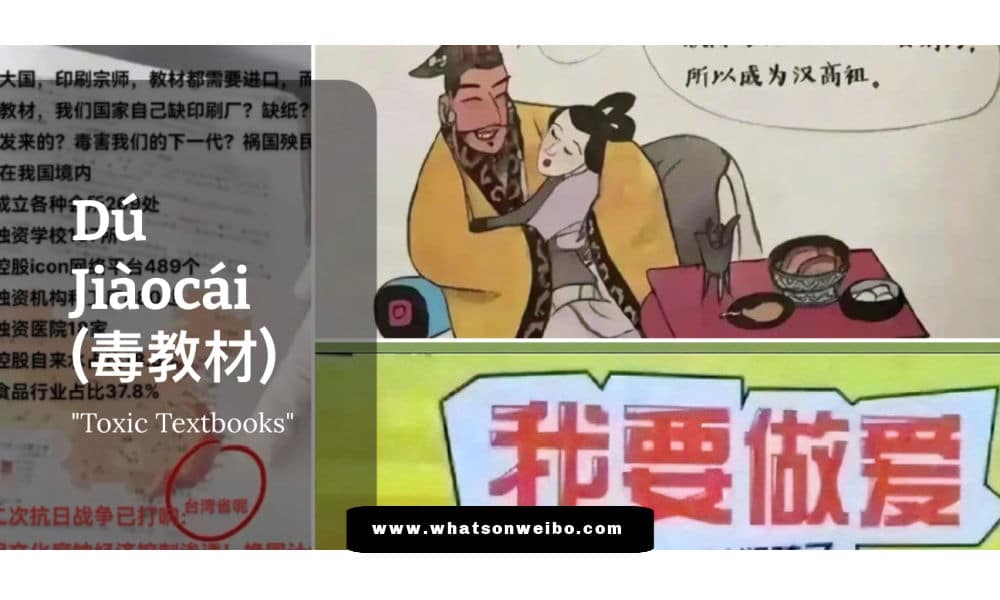
Dú Jiàocái (毒教材)
Over the past few years, school textbooks that are deemed harmful or contain content that is perceived as offensive, unpatriotic, vulgar, or unsightly have received a lot of attention in China. Remember the ugly textbook scandal of 2022? Or the sexual education textbook of 2017? This year, the term ‘toxic textbook’ or ‘poisonous textbook’ – dú jiàocái 毒教材 – went trending on Weibo after famous commentator/writer Sima Nan made a video in which he warned about the return of the toxic textbooks. Issues highlighted include a geography textbook featuring Japan’s Mount Fuji instead of Chinese landmarks, illustrations depicting Japanese families over Chinese ones, maps omitting Taiwan from Chinese territories, and even primary school books with QR codes leading to inappropriate content. Concerned parents are urging authorities to take decisive actions to ensure the quality and appropriateness of school materials.
#5: RECOVER FROM COVID

Yángkāng (阳康)
As the worst peak of China’s 2023 Covid outbreak had ended by March of 2023, the word used to say ‘recover from Covid’ became a popular online phrase. This novel word is a combination of 阳 yáng, meaning [to test] ‘positive,’ and the word 康 kāng meaning ‘healthy.’ The word is also a pun based on a character in Jin Yong’s martial novel The Legend of the Condor Heroes, namely 杨康 Yáng Kāng. New language travels fast, and by now, the word has already become ingrained in everyday life. Some hospitals even opened their own “Covid Yangkang Clinics” (新冠阳康门诊) to help patients who are still suffering from symptoms after testing negative.
#6: DISCOURSE TRAP
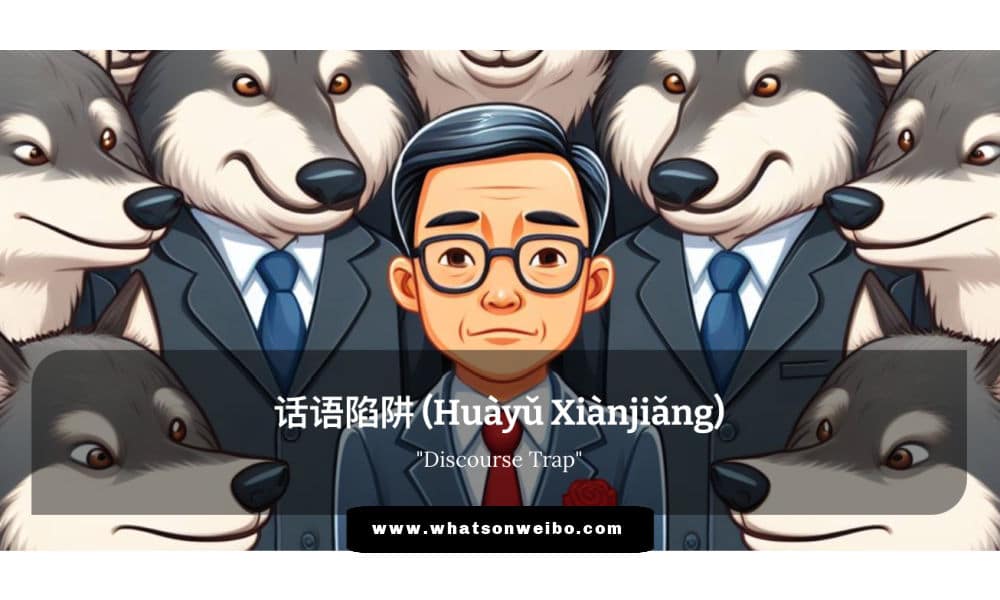
Huàyǔ Xiànjiǎng (话语陷阱)
The “discourse trap” (话语陷阱) came up in relation to the speech made by China’s Foreign Affairs Minister Qin Gang (秦刚) in March of 2023. During his address at the Two Sessions, Qin highlighted how foreign media commonly use the term ‘wolf warrior diplomacy’ to describe Chinese foreign relations. Qin argued that this term has become a “discourse trap.” By this, he meant that the phrase has been so deeply embedded in Western discussions about China’s foreign policy that it hinders genuine understanding of the actual dynamics. Qin implied that, contrary to perceptions, Chinese diplomats are the ones who are actually ‘dancing with wolves’ while navigating complex international relations. Interestingly, later in 2023, Qin Gang was suddenly replaced in his role by Wang Yi, the CCP’s most senior foreign affairs official. No official explanation was provided for this unexpected change.
#7: CAO CAO FLIPS THE RICE BOWL

Cáo Cāo Gài Fàn (曹操盖饭)
A viral meme originating from the Chinese TV series Three Kingdoms (三国) gained significant traction on Chinese social media in 2023. In a memorable scene from the 2010 series, Cao Cao, a prominent warlord in Chinese history played by actor Chen Jianbin (陈建斌), angrily flips his rice bowl upon receiving news of a surprise attack, only to gather the spilled rice back into the bowl later. This scene featuring an enraged Cao Cao has resurfaced and struck a chord with individuals reluctantly facing reality. Turning into a popular meme, ‘Cao Cao flipping the rice bowl’ (曹操盖饭) became widely employed to convey sentiments of self-inflicted humiliation or the hesitation to undertake certain actions. Read more here.
#8: REVIVE CHINA BIDEN
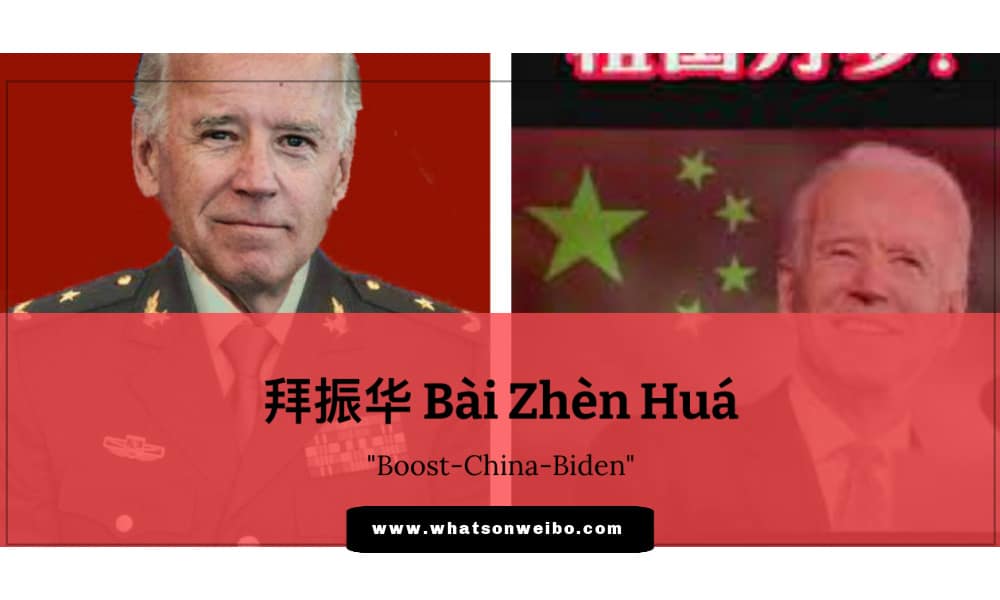
Bài Zhèn Huá (拜振华) – “Revive China Biden”
While delivering a speech to the Canadian parliament in March of 2023, U.S. President Biden accidentally said he “applauded China for stepping up.” He then quickly corrected himself and saying he meant to say ‘Canada’ instead of ‘China.’ Because of this slip of the tongue, many Chinese netizens joked that Biden secretly supports China. They referred to him by the nickname “Revive the Country Biden” (Bài Zhènhuá 拜振华), also translatable as ‘Thriving China Biden’. This nickname already circulated online since 2020 and matches with one that was previously given to former President Trump, namely that of “Build the Country Trump” (Chuān Jiànguó 川建国). The idea behind these humorous monikers is that both Trump and Biden are benefitting China by doing a poor job in running the United States and saying things that actually make China stronger (read more).
#9: CYBER YINAO
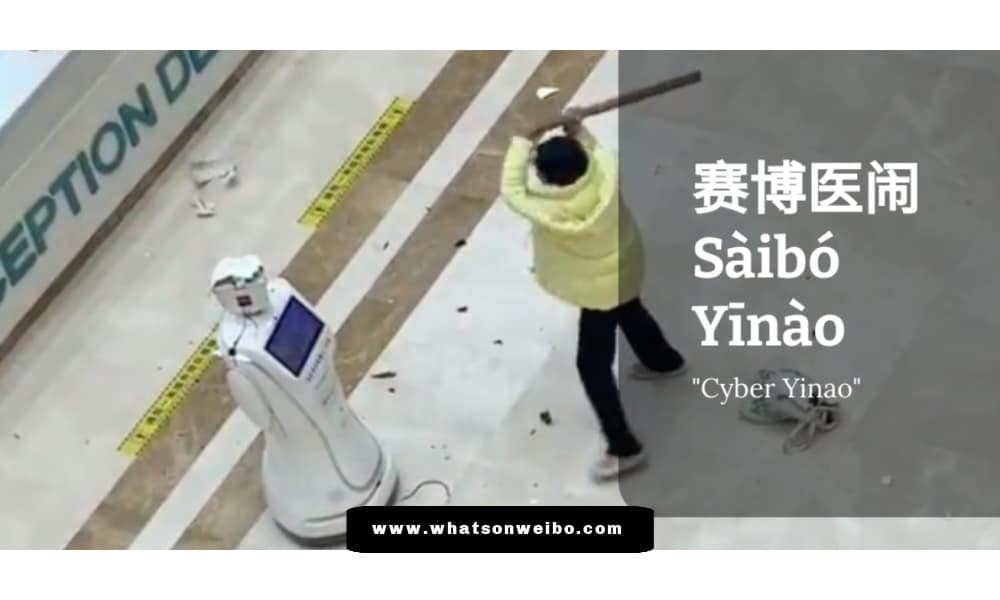
Sàibó Yīnào (赛博医闹)
Yinao (医闹) refers to the social problem of patient-doctor violence and other outbursts of anger against medical staff. A video showing a woman attacking a service robot in a local hospital went viral on Chinese social media and beyond in April of 2023. The incident reportedly took place at a Xuzhou Medical University hospital in Jiangsu, where an angry woman got so frustrated that she started swinging at the robot with a bat. Some netizens called this a form of ‘Cyber Yinao’ (Sàibó Yīnào 赛博医闹). With smart robots becoming a more important part of China’s service industry, from banks to hospitals, we might come across this term more often in the future when patients and their families lash out against the robotic staff members in the medical field.
#10: FULL TIME SONS AND DAUGHTERS

Quán Zhí Ér Nǚ (全职儿女)
In 2023, Chinese media outlet Toutiao News (头条新闻) featured the story of Nian An, a young woman who quit her job without securing a new one (also called “naked resignation” luǒcí 裸辞), and who made the decision to temporarily rely on her parents for support. She spent every weekend at her parents’ house, assisting her mother with dinner preparations and providing companionship. In return for her presence, her parents offer her a monthly allowance of 4000 yuan ($570), with the option to request additional funds if needed. Nian An viewed being a “full-time daughter” as a “freelance job full of love” (“充满爱的自由职业”). Nian An’s story led to online discussions about being a “full-time child” (全职儿女), which is different from “living off parents” (啃老). Being a “full-time child” is a transitional stage that allows young people to prepare for graduate school or switching jobs while exchanging their caretaking efforts for financial support from their parents.
#11: SECOND POSITIVE
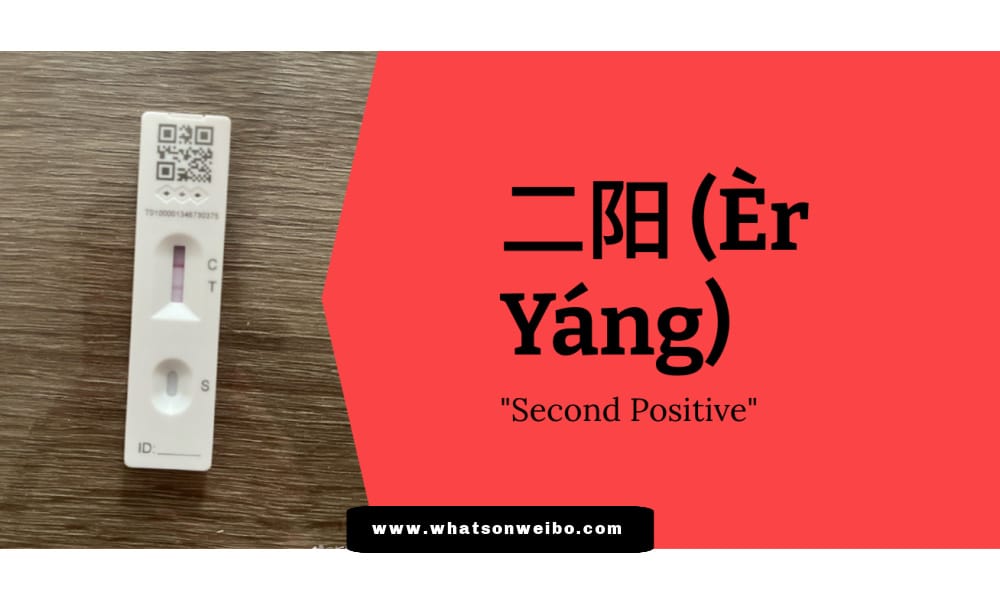
Èr Yáng (二阳)
This buzzword directly translates as “second positive” and was at the top of China’s social media trending lists over the last summer or late spring, when the country was facing a second major Covid wave. The character 二 èr means two or second. The character 阳 yáng means [to test] positive, and is used in the context of testing positive for Covid-19. The meaning of the phrase is “to get COVID for a second time” as many people in China got infected for the second time in the summer of 2023, after most people got their first infection in late 2022.
#12: WHITE PEOPLE FOOD

Báirén Fàn (白人饭)
This year, the topic of “white people food” went viral on China’s Little Red Book (Xiaohongshu) app and beyond. The phenomenon stems from Chinese observations of typical white foreigners’ lunches, often comprising raw veggies, boiled eggs, chicken breast, processed meats, and fruits or juices. In contrast, traditional Chinese meals emphasize warm dishes paired with rice or noodles. “White people food” is commonly characterized by its simple ingredients, straightforward preparation methods, and perceived lack of flavor. Some Chinese netizens try out “white people food” out of curiosity, considering eating raw celery or baby carrots as a novel “challenge.” Others choose it because they are willing to trade the taste of food for the convenience of buying ingredients and preparing meals quickly. One user on Xiaohongshu shared, “After reaching the stage where I eat only for survival, I’ve started to appreciate ‘white people food’ because I can prepare it very quickly” (read more here).
#13: RESIGNATION CEREMONY
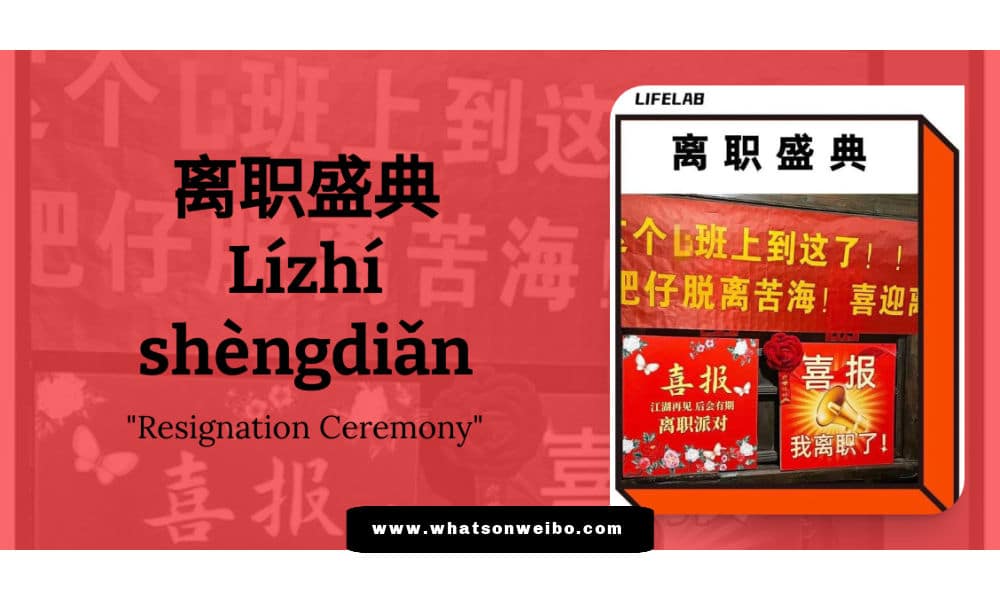
Lízhí Shèngdiǎn (离职盛典)
Hooray, I quit my job! The phenomenon of the “Resignation Ceremony” (lízhí shèngdiǎn 离职盛典 ) emerged as a trend in 2023 where young individuals go to great lengths to celebrate their departure from a job with banners and hotpot dinners. With job security declining, quitting one’s job has become more common in today’s China. This increased frequency has made something that was previously considered somewhat embarrassing more acceptable and natural. Moreover, the prevalence of China’s intense ‘996 work culture’ has fueled the desire among young people to quit their jobs. As a result, the process of resignation has transformed from a secretive and silent departure into a joyous occasion comparable to receiving a promotion.
#14: SMALL TOWN UPPER CLASS LADIES
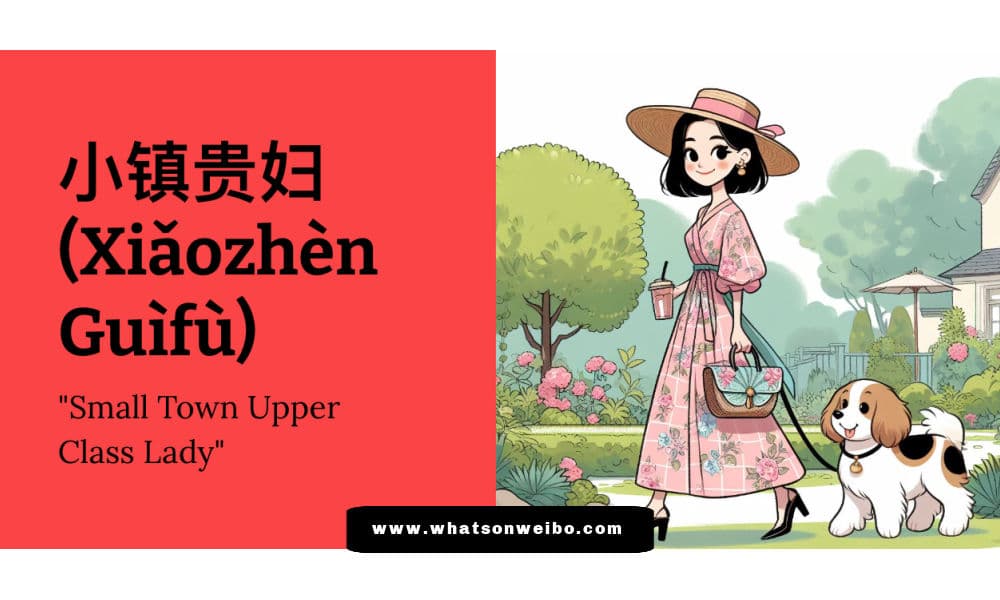
Xiǎozhèn Guìfù (小镇贵妇)
The phenomenon of the “small-town elites” has been popping up more frequently in Chinese online media and on lifestyle app Xiaohongshu throughout 2023. The term “small town upper class ladies” (小镇贵妇) refers to women who reside in small towns and are leading comfortable lives close to their hometowns. They do not need to rush to work early in the morning, don’t struggle with hard jobs, and earn a comfortable living, seemingly without the stresses of urban life. They are envied by urban dwellers, not only because of their financial stability – often thanks to their affluent families – but also because of the free time they have to engage in various activities, such as decorating their homes or doing yoga.
#15: PURE IDOLS

Nèiyú Chúnyuán (内娱纯元)
They are the ones who are staying “pure” in times of scandal. The “Chunyuan of the entertainment industry” refers to idols in Mainland China who are regarded as flawless and worthy of admiration. The term “内娱” (nèiyú) is a shortened form of “内地娱乐圈” (nèidì yúlèquān), which means the Mainland entertainment industry. Meanwhile, “纯元” (chúnyuán), meaning ‘pure essence,’ symbolizes individuals seen as pure and perfect. In light of the numerous scandals involving idols in mainland China in recent years, including prominent stars like Fan Bingbing (范冰冰), Kris Wu (吴亦凡), or Cai Xukun (蔡徐坤), discussions have emerged around identifying figures who remain untainted by controversy and are still deserving of being cherished as flawless role models.
#16: CALLING A RAT A DUCK

Zhǐ Shǔ Wéi Yā (指鼠为鸭)
There is a famous Chinese idiom, zhǐ lù wéi mǎ 指鹿为马, that translates to “calling a deer a horse” (or “calling a stag a horse”), meaning to misrepresent something. The phrase comes from a story about the corrupt eunuch and minister Zhao Gao (赵高) during the Qin Dynasty who brought a deer to the second emperor, presenting it as a “horse.” Fearful to disagree with him, many people followed him and also identified the animal as a horse. In June of 2023, a student found a rat head – teeth and all – inside his school canteen meal and posted about it on social media. As the incident blew up, the school refused to admit any wrongdoing and argued that the student was mistaken, insisting that it was actually duck he found. Reflecting on this peculiar incident (read), the idiom has evolved, with people coining the phrase “calling a rat a duck” (zhǐ shǔ wéi yā 指鼠为鸭) to capture the absurdity of the situation.
#17: THE UNKILLABLE SHIJIAZHUANG GUY
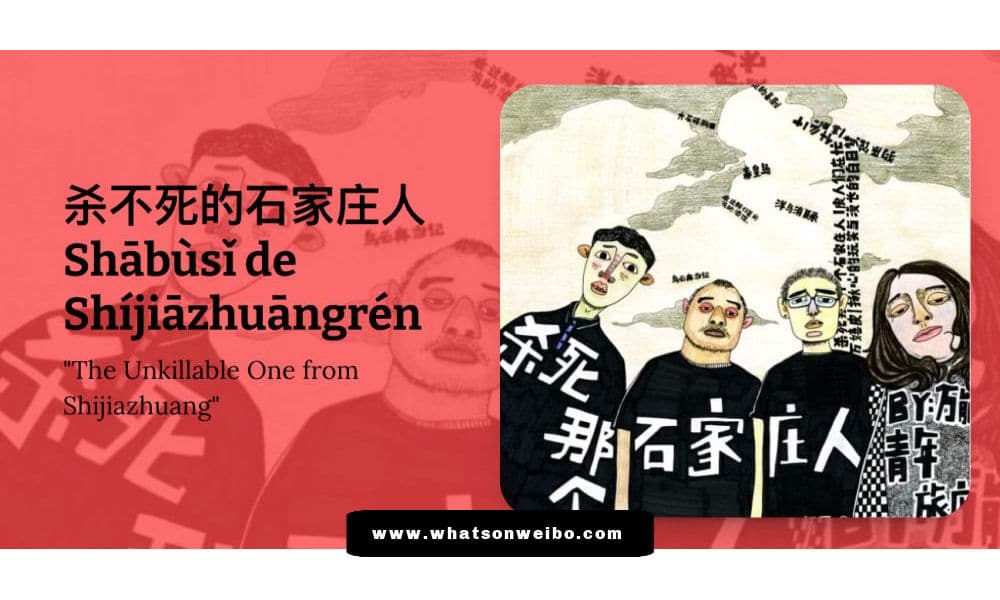
Shābùsǐ de Shíjiāzhuāngrén (杀不死的石家庄人)
Shijiazhuang is the capital and most populous city of China’s Hebei Province which has been attempting to rebrand itself as China’s rock ‘n’ roll capital to boost tourism and its local economy. As part of this revamping, the phrase “The Unkillable One from Shijiazhuang” (杀不死的石家庄人) has become a popular term on Chinese social media. Shijiazhuang used “The Unkillable Shijiazhuang” as its slogan to spread positivity, but netizens primarily used it sarcastically. It comes from a song released by the Hebei Communist Youth League in 2022, which serves as a ‘harmonious’ reinterpretation of the renowned 2010 Chinese song “Kill the One from Shijiazhuang” (杀死那个石家庄人) by the Chinese rock band Omnipotent Youth Society. The original song, which delved into the turbulence stemming from widespread job losses, deeply resonated with Chinese youth. The reworked song title and its association with Shijiazhuang’s rebranding as a “Rock N Roll center” led to humorous adaptations online, partly poking fun at the Communist Youth League’s attempt to revise a song that once conveyed hardship into one echoing state propaganda, and showcasing a form of self-deprecating expression among netizens.
#18: ANTI RADIATION

Fáng Fúshè (防辐射)
Since Japan began releasing treated radioactive water from the damaged Fukushima power plant into the ocean, various related discussions surged across Chinese social media platforms, making it one of the biggest trending topics of the year. In light of worries over contaminated water, concerned netizens started to actively seeking ways to safeguard themselves against potential radiation risks. The term “anti-radiation” therefore gained significant popularity online and some businesses attempted to profit from these radiation concerns. One Japanese-style restaurant in Shanghai even offered an “anti-radiation” set meal (“防辐射”套餐).
#19: HUAXI COINS
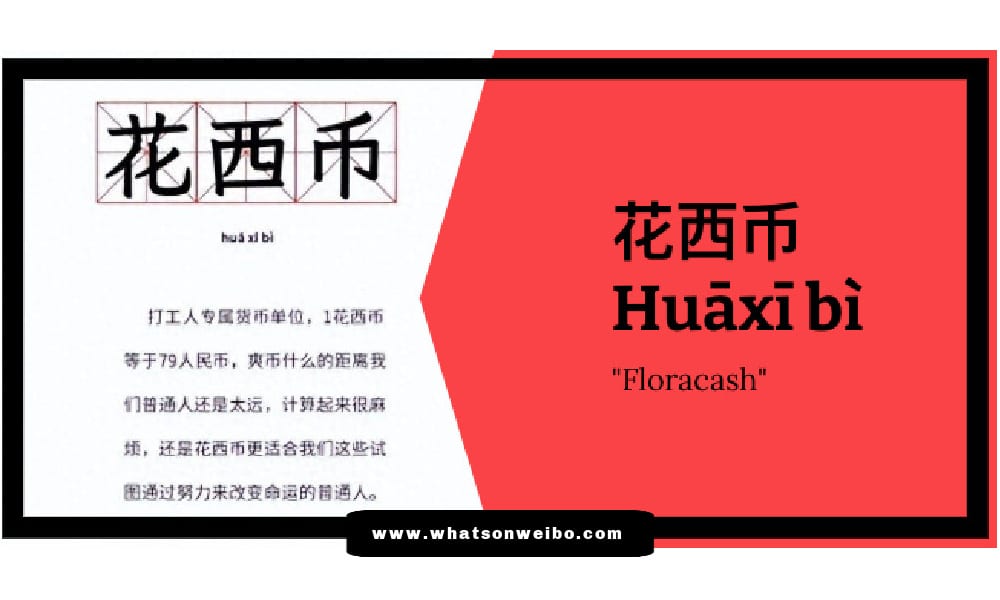
Huāxī bì (花西币)
It was one of the biggest controversies in 2023: China’s most famous beauty influencer Li Jiaqi (Lipstick King) suddenly lashed out against a viewer who questioned the price of an eyeliner he was selling during a livestream. Li was promoting Chinese make-up brand Florasis, which is known as Huāxīzǐ (花西子) in China, and some viewers thought 79 yuan ($11) was a bit expensive for a pencil, after which Li rolled his eyes and snapped that viewers should instead ask themselves if they had worked hard enough to deserve a raise. Him saying “what do you mean, expensive?” (“哪里贵了”) instantly became a meme-worthy phrase. The incident sparked a series of memes and discussions, and among them the question of what one can buy with 79 yuan in China today was a big one. While some suggested they could feed an entire family for one day with that money, others said that it would buy their office lunches for a week. This humorous situation gave rise to the term ‘Huaxi Coins’ or ‘Floracash’ (花西币), with netizens playfully using the eyebrow pencil’s price as a new currency unit, where one Huaxi Coin equals 79 yuan. People even started jokingly expressing their earnings in Huaxi Coins, and some proudly mentioned the cost of snacks or meals, saying things like ‘it only cost me a quarter in Floracash for three’ or ‘tonight’s dinner was just half a Huaxi Coin!'”
#20: FAR AHEAD
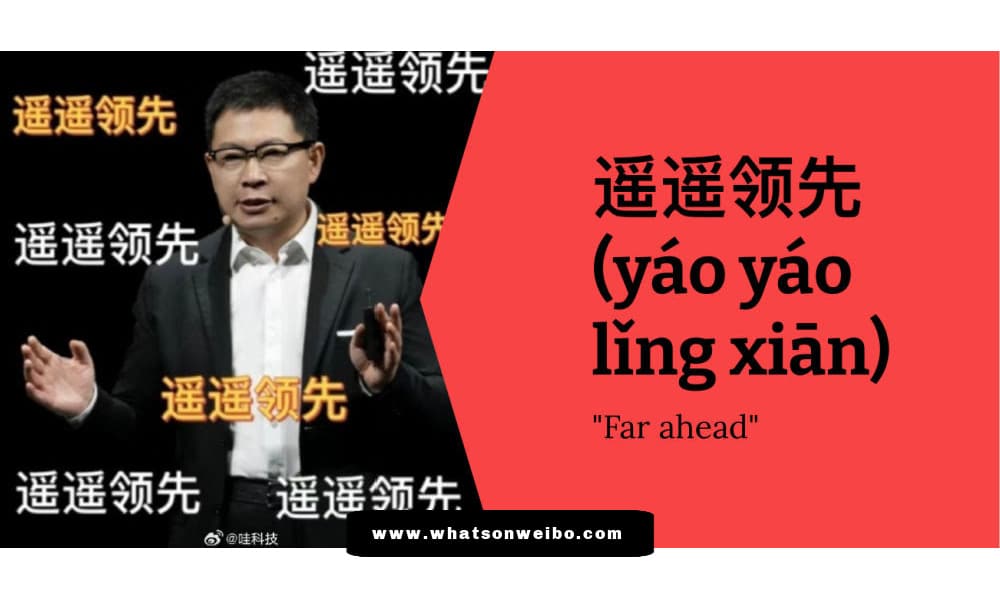
Yáo Yáo Lǐng Xiān (遥遥领先)
During the much-anticipated Huawei launch event in September of 2023, consumer chief Richard Yu unveiled an impressive array of Huawei’s latest products and innovations, such as the latest version of its MatePad Pro (the world’s lightest and thinnest tablet of its kind), a new smart TV, wireless earphones, and he also announced Huawei’s first sedan, the Luxeed S7, promising it would be “superior” to Tesla’s Model S “in every specification.” During his speech, Yu recurringly used the phrase “far ahead”, “遥遥领先” (yáo yáo lǐng xiān), to indicate that Huawei is fully future-proof and far ahead of other companies. As a result, the phrase became popular among Chinese netizens, who started using it for all kinds of things. It did not take long for the phrase to get registered as a trademark by some business owners in Shenzhen who hope it might bring them some profit.
#21: SPECIAL FORCES TRAVEL
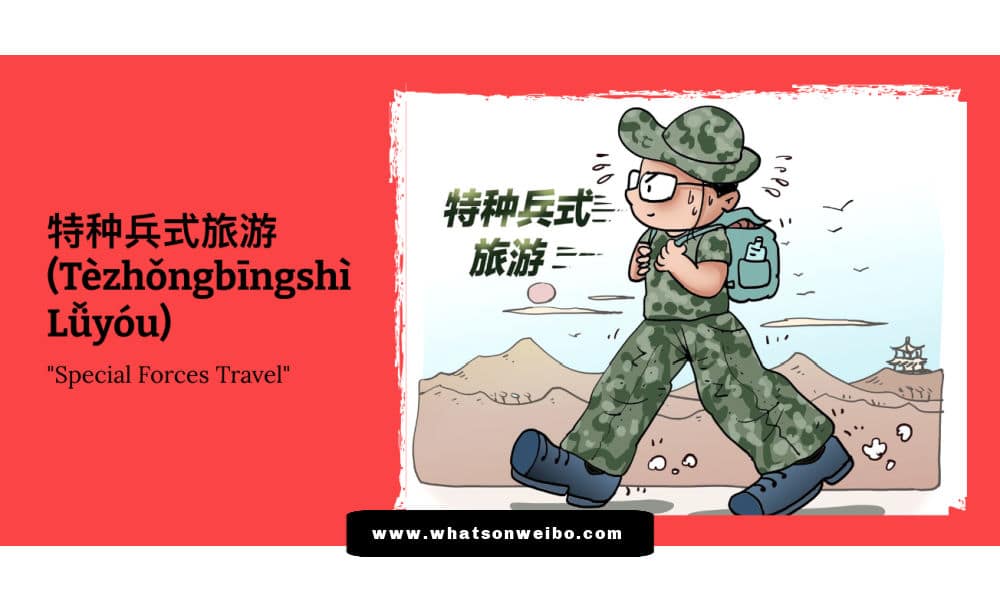
Tèzhǒngbīngshì Lǚyóu (特种兵式旅游)
Fun, fast, frugal travel was all the rage in this ‘post-lockdown’ year. As people could go out to travel again, so-called ‘special forces travelers’ flooded popular tourist spots across China. Their mission: covering as many places as possible at the lowest cost and within a limited time frame. On social media, young travelers shared their strict schedules of arriving in a certain place and then climbing mountains in the morning, doing city tours during the day, and participating in a local cuisine cooking class at night before taking off again and save on hotel money by taking a night bus to the next destination. While the travel trend became a social media hype, there were also those criticizing the trend for being superficial.
#22: REVERSE CONSUMPTION
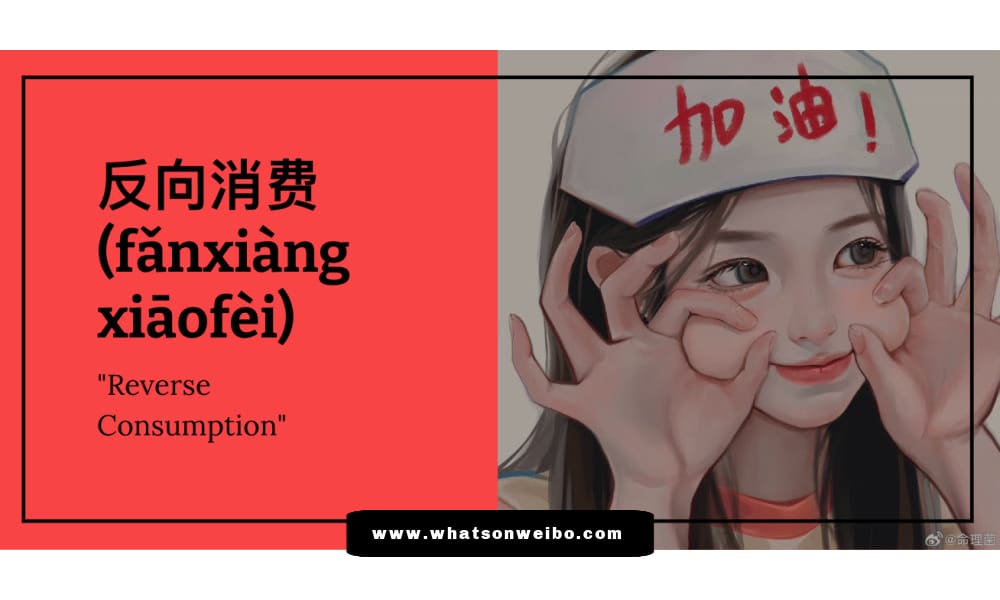
Fǎnxiàng Xiāofèi (反向消费)
This year, especially during the online shopping festival season, the concept of Chinese consumers engaging in ‘reverse spending’ or ‘reverse consumption’ – also known as ‘rational consumption,’ – became a hot topic. ‘Reverse consumption’ is a recent trend that is especially popular among Chinese young people, and that is all about pursuing sustainable and cost-effective products instead of focusing on consuming for the sake of buying brands or spending money. The trend does not necessarily suggest a focus on cheap products, but rather a refusal to celebrate consumerism and overpay for products that lack value for the price. Some Weibo users view this trend as a reaction to the constant shopping festivals and the pressure on young people to keep buying more in the thriving Chinese e-commerce market, leading to increased luxury consumption. As consumer attitudes gradually begin to change, young people no longer simply believe that “expensive means good,” and are now being more rational in their shopping behavior that is more about ‘value for money.’
#23: TOXIC FANGIRLING
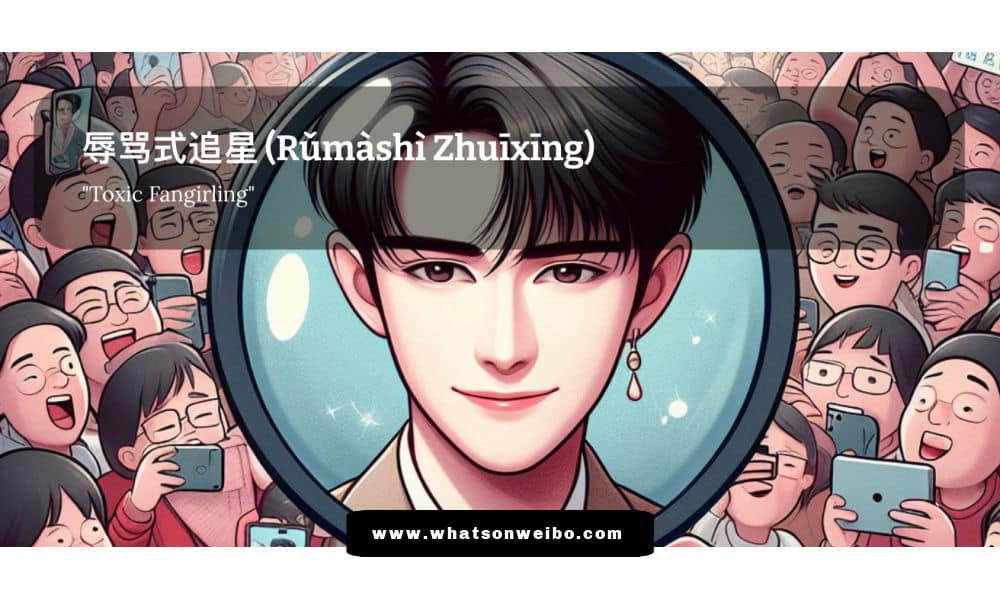
Rǔmàshì Zhuīxīng (辱骂式追星)
In China’s ever-evolving fan culture, the phenomenon of ‘rǔmà shì zhuīxīng‘ (辱骂式追星, lit: ‘abusive-style celebrity admiration’) or ‘toxically fangirling’ has become a trend this year. This term refers to a rather extreme way for fans to engage with their their idols. When pleased, they express intense love and support for their idols, but they can turn into abusive trolls targeting their idols when dissatisfied. This shift from love to aggression can be triggered by small things, like an unflattering photo or an unsatisfactory performance. Initially viewed as a departure from blind loyalty, this fan behavior has now turned somewhat toxic. Netizens interpret this ‘toxic fangirling’ phenomenon half ironically, half seriously, suggesting its origin may be rooted in the collective childhood trauma of Chinese fangirls.
#24: SUBJECT THREE DANCE
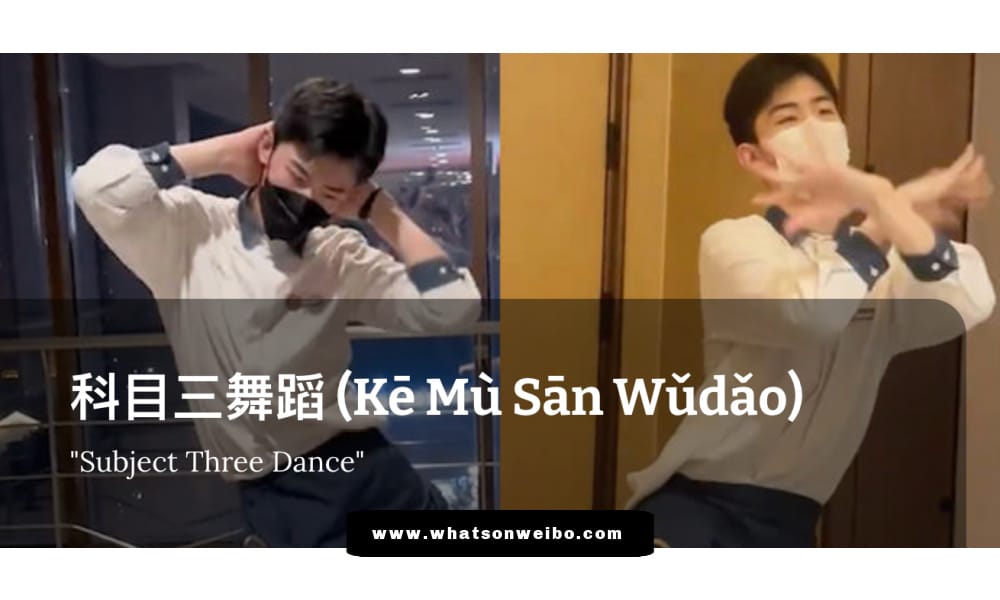
Kēmù Sān Tiàowǔ (科目三跳舞)
‘Subject Three’ has become a buzzword on Chinese social media in 2023 in connection with a viral dance, the Subject Three Dance (科目三舞蹈). From Douyin to Bilibili, the dance is super popular online and is performed by various people, from online influencers to virtual vloggers. The dance has become especially big since the renowned Chinese hotpot chain Haidilao allowed its staff to perform this viral dance for diners upon request, leading to amusing and occasionally awkward situations. The term ‘Subject Three’ allegedly first gained traction in 2022 or early 2023 following a video showcasing the jubilant atmosphere of a Guangxi wedding. Subsequently, ‘Guangxi Subject Three’ (广西科目三) became a popular joke. Although traditionally associated with the third part of a driver’s license exam, people playfully suggested that Guangxi locals undergo three significant “exams” in their lifetime: one for singing folk songs, one for mastering the art of slurping rice noodles, and the third for dancing (“广西人一生中会经历三场考试,科目一唱山歌,科目二嗦米粉,科目三跳舞”). By now, the dance has transcended its original context of Guangxi weddings and Haidilao staff dances, as it’s turned into a true social media hype where people create and share videos of themselves and others performing the Subject Three Dance, which is characterized by playful and exaggerated movements accompanied by the background music of “江湖一笑” (Jianghu Smile), making it entertaining, humorous, and, most of all, meme-worthy. .
#25: RAT-LIKE HANDSOME

Shǔxì Shuàigē (鼠系帅哥)
The term “Rat-Type Handsome Guy” (鼠系帅哥) has actually been around for some time, but attracted more attention on Chinese social media recently. The word is part of a group of other terms to describe popular aesthetics of famous men with features resembling animals. In 2022, for example, the “Monkey-Type Handsomes” (猴系帅哥) were especially popular. The term was used to describe the kind of Chinese celebrities who were undeniably handsome and also showed some resemblance to monkeys due to their strong brow ridges, narrow and long face, thin upper lip, and prominent T-zone. When categorizing handsome men in China’s entertainment industry into animal-types, from monkeys to snakes, from dogs to birds, it is not always only about facial features but also about a certain air or vibe (氛围感) that surrounds an idol. A loyal and cute dog-like vibe, a calm and strong ox-like feeling, or a sharp and sexy cat-like character. This year, the ‘rat-like’ handsome men have been more in vogue. They have small eyes, a pointed jaw and a small mouth. Although not all actors who are rat-like are deemed handsome, those that are handsome are all the more rare – and popular.
By Manya Koetse, with contributions by Ruixin Zhang, Zilan Qian, and Miranda Barnes
Get the story behind the hashtag. Subscribe to What’s on Weibo here to receive our newsletter and get access to our latest articles:
Spotted a mistake or want to add something? Please let us know in comments below or email us. First-time commenters, please be patient – we will have to manually approve your comment before it appears.
©2023 Whatsonweibo. All rights reserved. Do not reproduce our content without permission – you can contact us at info@whatsonweibo.com.
Manya is the founder and editor-in-chief of What's on Weibo, offering independent analysis of social trends, online media, and digital culture in China for over a decade. Subscribe to gain access to content, including the Weibo Watch newsletter, which provides deeper insights into the China trends that matter. More about Manya at manyakoetse.com or follow on X.

You may like
China Memes & Viral
Trump and Takaichi: The Unexpected Love Affair
The meeting between US President Donald Trump and new Japanese Prime Minister Sanae Takaichi became a popular topic on China social media, thanks to a stream of meme-worthy moments.
Published
4 weeks agoon
November 2, 2025
It was a pleasant autumn day in Tokyo on October 28, when Trump first met Japan’s newly-elected Prime Minister Sanae Takaichi (高市早苗).
Takaichi welcomed Trump at the State Guest House as her first foreign guest since taking office as Japan’s first-ever female leader, offering what Yomiuri Shimbun described as “Takaichi-style hospitality.”
During the visit, Trump and Takaichi held a bilateral summit during which Takaichi expressed desire to build a new “golden age” for the US-Japan alliance. Afterwards, they signed agreements and exchanged gifts — a golf bag for Trump, signed by Japanese golf star Hideki Matsuyama (with whom Trump has previously played), and “Japan is Back” baseball caps for Takaichi.
Following a lunch that featured Japanese vegetables and American steak, the two visited the US Navy’s Yokosuka base, where Trump remarked that he and Takaichi had “become very close friends all of a sudden.”
On Chinese social media, the meeting drew considerable attention.
There has been heightened focus in China on Sanae Takaichi beyond anti-Japanese sentiment and her recent appointment as Japan’s first female Prime Minister — as she is widely regarded as a far-right politician who denies, downplays, or glorifies historical facts related to the Second Sino-Japanese War (1931-1945).
Japan’s official narrative of its wartime past has long been a major obstacle to deeper reconciliation between China and Japan, and it is highly unlikely that Takaichi’s views of the war are going to bring China and Japan any closer. Among others, she is known for visiting Yasukuni Shrine, the Tokyo shrine that honors Japan’s war dead (including those who committed war crimes in China). She also claimed that Japan’s aggression following the Manchurian Incident, which led to the outbreak of the Second Sino-Japanese War, was an act of “self-defense.”
In light of these tensions in Sino-Japanese relations, and because of the changing dynamics in the current US-China relationship, many details surrounding the Trump–Takaichi meeting became popular talking points.
🔴 Trump: Reaffirming US Dominance, Insensitive to Japan’s Wartime Past
Many netizens focused on moments they interpreted as Trump asserting dominance or showing disregard for Japan.
👉 One awkward moment showed how, during the welcoming ceremony, Takaichi failed to properly escort the US president. He walked ahead of her twice, and, despite the cues to salute the Japanese flag, Trump simply walked past it instead, leaving Takaichi looking visibly surprised (video).
While some saw it as a case of poor etiquette instructions behind the scenes, most reactions framed it as a sign of power dynamics in the US–Japan relationship, with some commenting: “Why would the master bow to his son?” (Hashtags: “Trump Skips the Japanese Flag” #特朗普略过日本国旗# and “Trump Ignores Takaichi Twice in a Minute” #特朗普1分钟内两次无视高市早苗#)
👉 Another widely discussed moment came at the Yokosuka base, where Trump invited Takaichi on stage and mentioned how their bond was based on WWII (“Born out of the ashes of a terrible war”) — a comment that seemed to catch Takaichi off guard (video). He quickly followed up with, “our bond has grown into the beautiful friendship that we have,” but not before her expression visibly changed.
Under the hashtag “Trump’s Remark Gave Takaichi a Scare” (#专家:#特朗普一句话吓了高市早苗一大跳#), Chinese media outlet Beijing Time (@北京时间) commented: “She was afraid that Trump might go on to say something she couldn’t respond to easily.”

Image by online creator.
👉 Later, at a reception at the US Embassy in Tokyo, Trump referred to the Pacific War as a “little conflict.” While the euphemism may have been aimed at promoting reconciliation (“We once had a little conflict with Japan — you may have heard about that — but after such a terrible event, our two nations have become the closest of friends and partners…” video), many Chinese netizens and outlets, including The Observer (观察者网) interpreted the remark as dismissive. This fueled hashtags like “Trump Calls the Pacific War a Small Conflict” (#特朗普将太平洋战争称作小冲突#) and “Trump Refers to Hiroshima and Nagasaki Bombing as a Small Conflict” (#特朗普称轰炸广岛长崎只是小冲突#).
🔴 Takaichi: Smiles & Body Language Seen as Deferential to US
Alongside critiques of Trump’s behavior, much attention was also paid to Takaichi’s facial expressions and body language.
On Chinese social media, she was widely seen as overly eager to please — described as “fawning over Trump” (谄媚) in an “exaggerated” (夸张) way. Global Times highlighted how even Japanese netizens were criticizing her gestures as inappropriate for a prime minister (#日本网民怒批高市早苗谄媚#).

Some jokingly drew comparison to the famous movie about Hachiko, the loyal Japanese dog and his owner, played by American actor Richard Gere.
Some commenters described her behavior as that of an affectionate “pet” eager for approval.

Meme in which Takaichi was compared to Captain Jia (贾贵), known for his exaggerated flattery and traitorous behavior.
One meme compared Takaichi’s expressions toward Trump to those of Chinese actor Yan Guanying (颜冠英), who played the supporting role of Captain Jia (贾贵) in Underground Traffic Station (地下交通站), a satirical Chinese sitcom set during the Japanese occupation. The character was known for his exaggerated flattery and traitorous behavior.
🔴 Trump & Takaichi: A US-Japan Love Affair
But the most popular kind of meme surrounding the Takaichi-Trump meeting portrayed them as a newly smitten couple or even newlyweds. AI-generated images and playful commentary suggested a “love affair” dynamic. Watch an example of the videos here.

AI-generated images circulating on social media.
Some netizens linked this imagery to deeper historical dynamics — drawing distasteful parallels to American troops in postwar Japan and the women involved with them, including references to the reinstatement of the “sexual entertainment” industry once used to serve US forces.

For many, however, it was more about humor than history.
Some shared images showed just how much happier Trump seemed to be meeting with Sanae Takaichi than with her predecessor, Shigeru Ishiba, in 2024.

A considerably warmer meeting.
In the end, there are two sides to this peculiar “love affair” meme.
👉 On one hand, it plays on the affectionate behavior and newfound friendship between the two — Trump held Takaichi close to him multiple times, and she said she would nominate him for the Nobel Peace Prize. At the same time, the portrayal reduces Takaichi to a submissive romantic partner rather than a political equal, reinforcing gendered stereotypes — a dynamic that likely wouldn’t have emerged as strongly if she were a man.
This kind of “couple pairing” is quite ubiquitous in Chinese digital culture, especially involving people who are unlikely to have an actual relationship in real life. And although censorship would never allow this kind of pairing to thrive online if it involved Chinese politicians, the fact that it features Trump and Takaichi makes it less susceptible to online control.
A previous example of a noteworthy “love affair” meme was the one pairing US Speaker of the House Nancy Pelosi with Chinese political commentator Hu Xijin (see it here).
👉 Second, the Trump–Takaichi meeting is often placed in a Chinese context — showing the two getting married in a Chinese-style ceremony or inserting them into Chinese film scenes. While this may seem like light banter, it also reveals a deeper layer to the discussion: many believe that China plays a central role in the US–Japan relationship, interpreting the meeting through a Chinese lens in which US–China dynamics and the history of Sino-Japanese war are all interconnected.
Will they live happily ever after? Some may fantasize they will — but others think the weight of the past, both American and Chinese, will always cloud their sunny future. For now, most enjoy the banter and how “political news has turned into a romance variety show” (“政治新闻愣成了恋综了”).
By Manya Koetse
(follow on X, LinkedIn, or Instagram)
Spotted a mistake or want to add something? Please let us know in comments below or email us. First-time commenters, please be patient – we will have to manually approve your comment before it appears.
©2025 Whatsonweibo. All rights reserved. Do not reproduce our content without permission – you can contact us at info@whatsonweibo.com.
China Memes & Viral
From Nobel Farewell to ‘VIP Toilets’: What’s Trending in China
From a tragic “wild child” case in Yunnan to the farewell of Nobel laureate Yang Chen-Ning, here’s what’s trending on Weibo and beyond this week across Chinese social media.
Published
1 month agoon
October 19, 2025
🔥What’s Trending in China This Week (Week 42, 2025)? Stay updated with China Trend Watch by What’s on Weibo — your quick overview of what’s trending on Weibo and across other Chinese social media.
1. “Wild Child” from Yunnan Sparks Concern and Investigation

Screenshots circulating on Chinese social media showing the “wild child” in Yunnan.
A tragic and widely discussed story from Yunnan has been trending on Weibo this week, centering on a 3-year-old boy from Nanjian County who was spotted near a highway service area — naked, neglected, and walking on all fours. Online videos led Chinese netizens to dub him the “feral child.”
There have been conflicting media reports on the case over the past few days. From The First Scene (@第一现场) to Shanghai Reporter (上观新闻) some claimed the child’s parents are impoverished and jobless while others reported the father and mother are actually highly educated and do have resources, but that the choice to raise their child like this is related to lifestyle philosophy. The parents reportedly insisted that the child used to suffer from eczema and found clothes irritating and painful, so “he doesn’t like wearing clothes.”
One thing that local villagers quoted in these reports agree on is that the situation is “not normal.” The child, who never wears clothing, allegedly mimics animal behavior and refuses to eat from his hands — preferring to eat food off the ground. Locals previously already villagers reported the situation to the police.
Authorities in Nanjian County have announced the creation of a special task force to investigate this case. Officials said no signs of human trafficking were found, and that the parents are currently outside Yunnan Province. According to Beijing Youth Daily, The child and his parents are now under supervision, although it is not clear what this actually means – since other sources say the parents are not willing to cooperate. They also have another boy, who is currently one year old. Authorities have also investigating whether the parents’ behavior constitutes a crime.
Manya’s Take:
The “wild child” story brings back memories of the Xuzhou mother of eight. That heartbreaking case also gained national attention after netizens shared a video showing a woman chained up in a shed next to her family home. The chaotic media coverage of that case mirrors what we’re seeing now: media outlets are quick to jump on the story, while local authorities — feeling public anger and pressure — rush to investigate, resulting in conflicting reports, rumors, and fake news. Both situations involve rural counties that would otherwise hardly ever make headlines, with local authorities often unequipped to handle such crises quickly. Hopefully, there will be a clearer update on this story soon.
2. China Responds to Trump’s Remarks on Soybean Trade and Cooking Oil

Soybeans have been trending this week. As China is boycotting American soybeans – the fourth most sold agricultural product from the country – farmers in the US are facing uncertain times, as it’s harvesting season and the biggest purchaser of soybean exports is China.
On Tuesday, Trump wrote on Truth Social that China was “deliberately halting U.S. soybean imports,” calling it an “economically hostile act.” He also threatened to terminate business with China regarding cooking oil and other areas of trade as retribution.
On Chinese social media, people seemed unimpressed. The term TACO is also seen more often, a popular abbreviation for “Trump Always Chickens Out.” The Foreign Ministry dismissed Trump’s claims as “unfounded” and emphasized China’s commitment to normal trade relations. On Weibo, commentator Hu Xijin wrote: “Haha, so he [Trump] slaps tariffs on China and blocks chip exports and that’s not considered ‘hostile’? But when China doesn’t buy soybeans, suddenly it is? What kind of logic is that!”
Manya’s Take:
Chinese netizens are treating this latest trade exchange with irony rather than outrage, not only viewing it as a sign of US inconsistency on trade but also there’s some banter about the ‘cooking oil’ threat: when the US side talks about banning imports of “Chinese cooking oil” many assume they meant edible oil (食用油), while what the US actually imports from China is used cooking oil (UCO, 废食用油/地沟油) — waste oil that’s recycled to make biofuels. So the joke is that even Trump himself is seemingly mixing up cooking oil and used cooking oil, moreover threatening a ban that would hurt itself more than China, turning this trade spat into a moment of internet humor.
3. Nanjing Deji Plaza Faces Backlash Over VIP-Only Restrooms

The exclusive members-only restroom at Nanjing’s Deji Plaza.
Nanjing’s luxury shopping mall Deji Plaza (德基广场) has sparked controversy after introducing members-only restrooms accessible exclusively to VIP members (天象会员) who spend over 200,000 yuan ($28,000) annually. Access requires scanning a Deji membership QR code.
Beyond offering peace and privacy, the restrooms feature Tom Ford vanity sets, Jo Malone handwash, and Dyson hairdryers. One Xiaohongshu blogger (and VIP member) noted, “The maintenance cost here is ten times that of a regular restroom.”
After news of the VIP restrooms went viral, it fueled debate about turning ‘a basic human need’ into a ‘class privilege’ or “privatizing a public facility.” One user commented, “Now even restrooms have to reflect the wealth gap?”
Despite the criticism, curiosity grew — many users purchased “code-scanning services” on secondhand platforms to gain access, quickly undermining the restroom’s exclusivity. In response to the controversy, Deji Plaza stated that the members-only restrooms would soon be dismantled and converted into a regular public facility. Regardless, and despite the backlash, the initiative seems to have been fruitful in terms of brand name recognition, as it got everyone talking about Deji Plaza.
Manya’s Take:
There’s some irony in this story: there’s controversy over a mall toilet being “VIP,” yet at the same time, it’s the exclusivity that makes people want to try it. According to the latest posts on Xiaohongshu (XHS) by Deji Mall visitors, the VIP toilets are already gone, and people are back to complaining about the restrooms being too crowded and dirty. One XHS commenter (西蒙吴) had the best take on the issue: in a time when Chinese media are working to downplay the country’s wealth gap and ease public resentment, Deji Mall made the right move by dismantling the card-access VIP toilets — if not for the pressure of online public opinion, authorities might have stepped in themselves. It was an unwise move simply because it was all about a toilet: unlike VIP waiting areas or service counters, consumers don’t like restrooms being divided by class. A smarter approach would have been to create a VIP lounge that just happens to include a restroom.
4. Arc’teryx Responds to Tibet Fireworks Show Environmental Damage Investigation

The controversial fireworks show held in Tibet on September 19.
This is a topic that has sparked outrage and continued discussion in China over the past weeks. On September 19, a major fireworks event was held at an altitude of around 5,500 m or 18,000 feet in Tibet’s Himalayas, created by famous Chinese artist Cai Guoqiang (蔡国强) and sponsored by the outdoor brand Arc’teryx.
The 52-second show, titled “Ascending Dragon” (升龙) was supposed to impress people for its spectacular and colorful use of 1,050 fireworks, but it triggered outrage instead: critics blasted it as tone-deaf commercialization and ecological abuse of sacred and fragile land, and soon an investigation was launched.
Now, the outcome of that investigation has also become a major talking point as it revealed disturbance to local wildlife and caused significant environmental damage of over 30 hectares of grassland.
Cai Guoqiang and his studio will be held legally accountable for environmental damage, and Arc’teryx, as a sponsor of the event, will also bear legal responsibilities. Furthermore, the relevant county officials who had initially approved the show without going through the proper channels are also punished: Party Secretary Chen Hao (陈浩) has been dismissed, and nine other county officials received formal penalties ranging from removal to warnings.
Manya’s Take:
A lot has already been said and written about this controversy. What it comes down to, in the public perception in China, is that the high ambitions and personal goals of the artist and the Arc’teryx brand — which built its image around environmental responsibility and authentic outdoor culture — were pursued at the expense of Tibet’s fragile environment and marginalized communities. Their so-called “dreamlike” event left lasting scars for a fleeting 52-second spectacle. More than just serving as a warning for brands to ensure their actions align with their “eco-friendly” promises, this entire case will undoubtedly go down in history as a moment of awareness — a case study for future art events and large-scale performances in nature in China — on what not to do, and on how to balance spectacle with responsibility.
5. Nobel Laureate Yang Chen-ning Passes Away at 103

Yang Chen-ning passed at the age of 103.
The death of the renowned Chinese theoretical physicist Yang Zhenning (杨振宁, 1922), also known internationally as Chen-Ning Yang, China’s first Nobel laureate in physics, has been trending across Weibo, Douyin, Zhihu, and Toutiao in recent days. Yang passed away in Beijing on October 18, 2025, at the age of 103, just weeks after celebrating his birthday on October 1.
On social media, Yang is remembered as a legendary physicist who devoted his life to science and truth. He shared the 1957 Nobel Prize in Physics with Li Zhengdao (李政道) for discovering parity violation in weak interactions, and co-developed the Yang–Mills theory with Robert Mills in 1954, a cornerstone of modern particle physics.
Many online tributes also recall Yang’s lifelong friendship with nuclear physicist Deng Jiaxian (邓稼先, 1924–1986). The two met in middle school and went on to become giants of Chinese science. Yang’s wife, Weng Fan (翁帆), has also become part of the online remembrances. Over 50 years his junior, she met Yang while she was a student; they married when she was 28 and he was 82. Her tribute to Yang, expressing gratitude for having shared his company for many years, has received over 140 million views on Weibo.

Manya’s Take:
There is certainly a strong sense of national pride in the accomplishments of Yang Chen-Ning, but on social media, much of the attention also centers on his relationship with his wife, who was 54 years younger. Many see Yang’s passing as a moment of reflection — was she there for the money and fame, or for love? Opinions are divided, but the fact remains that the two were married for over twenty years, and she stayed by his side throughout. Some argue that Yang was simply so extraordinary, in both mind and body, that he naturally connected with younger people — and they with him. Others say their love was “timeless,” that true soulmates (灵魂伴侣) do not see age. Either way, it’s clear that 2025 netizens aren’t all cynics — there are quite a few romantics out there.
Spotted a mistake or want to add something? Please let us know in comments below or email us. First-time commenters, please be patient – we will have to manually approve your comment before it appears.
©2025 Whatsonweibo. All rights reserved. Do not reproduce our content without permission – you can contact us at info@whatsonweibo.com.
Subscribe
Eye on Digital China is a reader-supported publication by
Manya Koetse (@manyapan) and powered by What’s on Weibo.
It offers independent analysis of China’s online culture, media, and social trends.
To receive the newsletter and support this work, consider
becoming a paid subscriber.

Get in touch
Have a tip, story lead, or book recommendation? Interested in contributing? For ideas, suggestions, or just a quick hello, reach out here.

Signals: Hasan Piker’s China Trip & the Unexpected Journey of a Chinese School Uniform to Angola

About Eye on Digital China — Powered by What’s on Weibo

China Trend Watch: Japan Tensions, Nexperia Fallout, Yunnan’s ‘Wild Child,’ & “Modern Opium”

Eye on Digital China: How Chinese Social Media Evolved from the Blog Era to the AI-driven Age

Trump and Takaichi: The Unexpected Love Affair

The Wong Kar-wai Scandal Explained: The Dark Side of ‘Blossoms Shanghai’

From Schadenfreude to Sympathy: Chinese Online Reactions to Charlie Kirk Shooting

From Nobel Farewell to ‘VIP Toilets’: What’s Trending in China

From Tents to ‘Tangping Travel”: New Travel Trends among Young Chinese

China’s “Post Parade Afterglow”: 6 Social Media Trends
Popular Reads
-

 China Memes & Viral4 months ago
China Memes & Viral4 months agoHidden Cameras and Taboo Topics: The Many Layers of the “Nanjing Sister Hong” Scandal
-

 China Insight7 months ago
China Insight7 months agoUnderstanding the Dr. Xiao Medical Scandal
-

 China Memes & Viral11 months ago
China Memes & Viral11 months agoOur Picks: Top 10 Chinese Buzzwords and Phrases of 2024 Explained
-

 China Digital10 months ago
China Digital10 months ago“Dear Li Hua”: The TikTok/Xiaohongshu Honeymoon Explained

